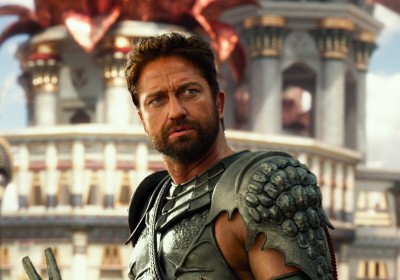
The gods bleed gold in Alex Proyas’ “Gods of Egypt,” a maximalist costume epic dramatizing the clash of Egyptian gods and humankind. Mortals dot the great expanse that is Proyas’ ancient Egypt, a digital dreamscape rendered with gaudy intensity.
The film enters theaters with public outcry already in tow. In November, the film and its studio, Summit Entertainment, met backlash when the trailer revealed a predominantly white cast for a story set in Egypt. The production budget sat at a fat $140 million, ostensibly all going toward an army of computer graphics engineers and the action headliners, Gerard Butler and Nikolaj Coster-Waldau. As flush as the film is with cash and style, though, it is just as lacking in thoughtfulness and tact.
Computerized imaging paints the entire film. Proyas amps up chrome reflections and gossamer sand clouds to an offensive extent. To make matters worse, the 3D flattens the picture and inflates the holographic elements, adding up to a feeling of dizzying fakery.
The heavy-handed use of otherwise unspectacular digital rendering made the film feel like an aimless cut-scene in some Egyptian mythology video game. The scenery becomes flawed and tediously redundant, the recorded dialogue repeats on a loop and the limits of the digital graphics become brutally evident.
The film in its early moments — for example, a tomb-raiding sequence with unmistakable references to Indiana Jones — felt like something ripped from better projects. For an epic sold on the premise of action, there are six fight scenes and three narrow escape scenes, all overly garish and incapable of leaving one on the edge of their seat.
While the film’s visual construction uses (overuses, really) 21st-century cinematic technology, its plotline lazily panders to shallow 20th-century film narratives. Centered on a love story and a comeback tale, the plot unfolds from the perspective of two white cis-bros — the god Horus (Coster-Waldau) and a young man named Bek (Brenton Thwaites).
Their tired journey weaves about the tumult caused when the god Set (Butler) usurps the throne of Horus’ father, Osiris, the Egyptian god of the afterlife. Thwaites, as somewhat of a newcomer, delivers a sufficient performance as the chirpy nonbeliever Bek, a nimble slave boy foil to Coster-Waldau’s 8-foot-tall Horus.
The dialogue is what one would expect for a big-budget fantasy-action adventure, but, to its credit, the film was self-aware enough to lace punchy, deprecatory meta-lines throughout. Coster-Waldau and Butler, known for their respectively butch turns in “Game of Thrones” and “300,” seemed to reprise their roles — Coster-Waldau utters the words “my father would” so many times, it felt intentionally referential. Yet, despite however self-aware the one-liners or comical the actors’ demonstrated range may be, “Gods of Egypt” is still a really problematic movie.
If the anachronistic casting was not unpalatable enough, the movie has a repugnant problem with women. Let not let the unfortunate whitewashing draw away from the presentation of detestable female depictions and tropes. Here are some credited character names of female characters in “Gods of Egypt”: Fussy Older Maidservant, First Young Maidservant, Second Younger Maidservant.
In fact, one of the young maidservants, while wielding a bullwhip and riding a giant snake, yells, “Pretty girls can’t fight!” at the closest thing to the movie’s female hero, Hathor (Elodie Yung). Hathor responds by doing exactly that — not fighting. She instead entrances the serpent and commands it to self-destruct.
Meanwhile, Bek’s love interest, Zaya (Courtney Eaton), is shamefully reduced to a damsel in distress. In a slave master’s bragging, the dialogue even suggests that she is a sex slave. In one scene, when Nephthys (Emma Booth) tries to escape from her husband, he grabs her by the wing, throws her on the floor and rips her wings from her back.
By the film’s end, no female figures shine in positions of power like the male figures do. The female characters are hyper-sexualized, as costumes and shot frames are primed to indulge the gaze. While trudging through a Nile marsh, Hathor, in a fit, rips the translucent skirt off of her gown, only to be scooped up into the sweaty arms of Horus. The expected retort is likely the same interpretation of feminism used to justify “slave Leia”: a female character wears whatever she wants and finds her beauty in herself alone. Yet, even if the film’s portrayal of the female body can be validated as feminist, the roles of this story’s female characters cannot.
In “Gods of Egypt,” no leading women exist, and Chadwick Boseman, the only black actor to play a main character, was the first lead to die, aside from the death of Osiris that sparked the narrative in the first place. It turns out that $140 million can buy a movie a lot of things, but a smarter worldview is a little more elusive.
























































































































